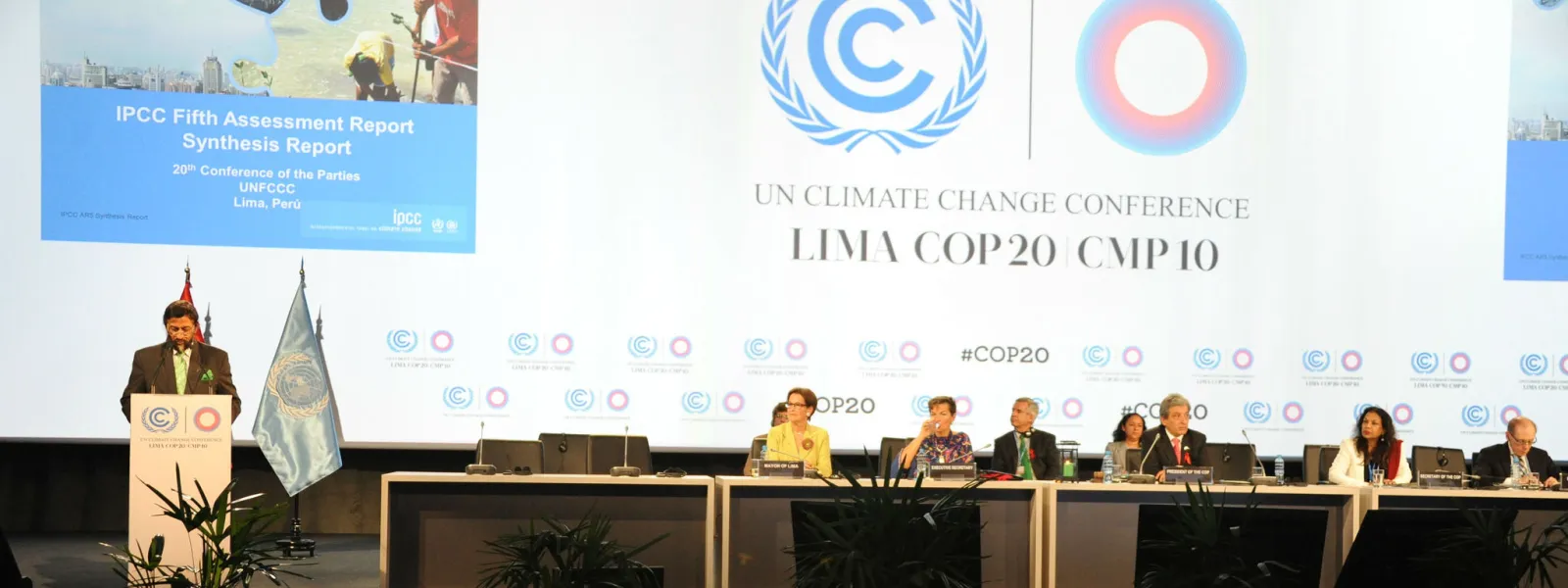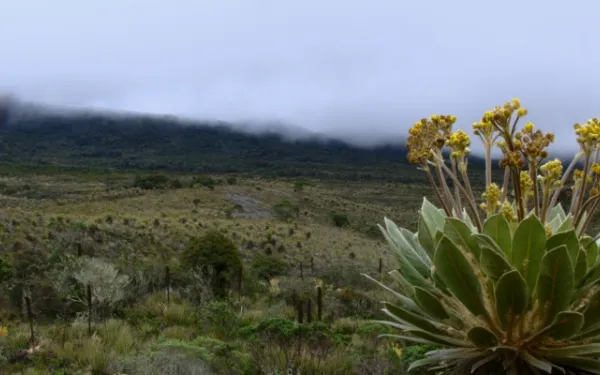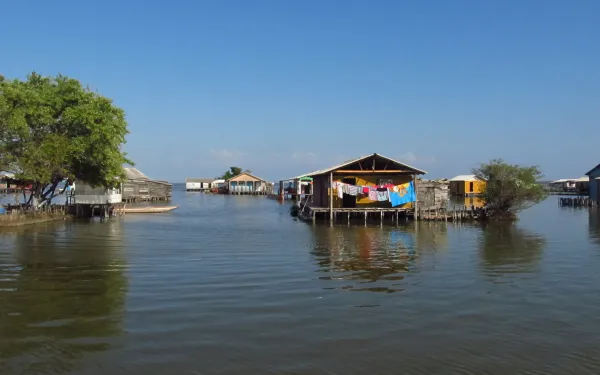
Project
Photo: UNFCCCMonitoring the UN Climate Negotiations
As changes in climate become more extreme, their affects are being hardest felt throughout developing countries. Since 1994, the United Nations Framework Convention on Climate Change has laid out actions to limit the increase of global average temperatures and confront the impacts of climate change.
The States that are Parties to the Convention meet every year in the so-called Conference of the Parties (COP) to review their commitments, the progress made in fulfilling them, and pending challenges in the global fight against the climate crisis.
At COP21 in 2015, they adopted the Paris Agreement, which seeks to strengthen the global response to the climate emergency, establishing a common framework for all countries to work on the basis of their capacities and through the presentation of Nationally Determined Contributions (NDC) that will:
- Limit the increase in global temperatures to 2°C compared to pre-industrial levels and continue efforts to limit it to 1.5°C;
- Increase the capacity of countries to adapt to the impacts of climate change; and
- Ensure that financing responds to the goal of reducing greenhouse gas emissions.
Our focus areas
THE CLIMATE CRISIS AND HUMAN RIGHTS
The climate crisis, due to its transversal character, has repercussions in various fields, geographies, contexts and people. In this regard, the Preamble to the Paris Agreement states that it is the obligation of States to "respect, promote and fulfill their respective obligations on human rights, the right to health, the rights of indigenous peoples, local communities, migrants, children, persons with disabilities and people in vulnerable situations and the right to development, as well as gender equality, the empowerment of women and intergenerational equity."
AIDA at the COP
COP25: Chile-Madrid 2019
At COP25 in Madrid, Spain, we advocated for the inclusion of the human rights perspective in various agenda items. We promoted the incorporation of broad socio-environmental safeguards in the regulation of Article 6 of the Paris Agreement, which refers to carbon markets. We closely followed the adoption of the Gender Action Plan, as well as the Santiago Network, created "to catalyze technical assistance […] in developing countries that are particularly vulnerable to the adverse affects of climate change." We also encouraged the inclusion of ambitious and measurable targets for the reduction of short-lived climate pollutants in the climate commitments of States.
Related projects

Eight key themes for Colombia’s environmental agenda in 2018
For Colombia, 2017 was a year marked by debate on the right of communities to be consulted about decisions that affect their territories and ecosystems. We saw it through the organization of popular consultations and mobilizations that questioned mining and fracking projects and, in short, the continuity of extractivism. It was also evident in the decision of the Constitutional Court, the highest court in the country, to invalidate the delimitation of the Santurbán páramo, a water source for millions, because the government’s decision did not take into account the population. On the other hand, Colombia joined the global debate on climate change and the need to promote a model of economic development free of fossil fuels. Now, in the face of the presidential elections and the implementation of the peace accord, environmental participation, territorial autonomy and fracking remain particularly important issues. What follows are eight topics key to Colombia’s environmental agenda in 2018: Environmental participation: Popular consultations, as an expression of empowered communities seeking to have a say on projects that will affect them, will continue holding a privileged place in public debate. Territorial autonomy: Although constitutionally recognized, the ability of departments and municipalities to govern themselves autonomously in various areas, including the environment, is not entirely defined. It remains to be answered: Who should decide? And about what can they decide? Indigenous authorities: Following on the heels of the above, the autonomy and decision-making ability of indigenous authorities in relation to environmental issues will give us much to discuss this year. Fracking: The key question is, faced with fracking’s expansion throughout the region, will Colombia adopt the position of social organizations on the application of the precautionary principle to avoid the health and environmental damages associated with fracking? Decarbonization: As an energy producer, will Colombia join France, the United Kingdom and Italy, nations that recently signed an alliance to close coal plants before 2030 and comply with the Paris climate agreement? La Niña: The strong winds and rains of the La Niña climate phenomenon will return to the country this year. Adequate measures to mitigate the risk will be fundamental, as will the application of lessons learned in 2010, when the phenomenon left hundreds dead and the loss of millions of pesos. Páramos: Following the decision of the Constitutional Court to invalidate the delimitation of the Santurbán páramo, this year promises to be full of controversies about the new delimitation of this important ecosystem. Also key will be the issue of community participation in the demarcation of the rest of Colombia’s páramos, a measure oriented to protect them against harmful projects like mining. Principle 10: The negotiation of a regional agreement on the access to information, to justice and to public participation on environmental issues, remains underway. The agreement seeks the application of Principle 10 of the Rio Declaration on Environment and Development, key to guaranteeing the right to a healthy and sustainable environment for present and future generations. At AIDA, and through the Network for Environmental Justice in Colombia, we will continue to promote solutions to the country’s environmental conflicts based on the effective application of national and international standards.
Read more
Sea turtle populations show sign of a comeback
Before 2008, hawksbill turtles had virtually disappeared from the Eastern Pacific. But small-scale conservation efforts enabled their return to the shores of El Salvador and Nicaragua, where researchers found them again laying eggs and slowly beginning to rebuild their population. Sea turtles are migratory animals. They spend most of their lives at sea, nesting on the beaches of various countries along their route. Among the main threats to their health are unsustainable fishing practices (they often get trapped in fishing nets) and inadequately developed projects in marine and coastal areas. The appearance of these turtles on Central American beaches, among other such events, demonstrates the success of small-scale conservation efforts, and the need for them to continue. Signs of recovery According to the recent study, Global sea turtle conservation successes, over the last decade sea turtle hatcheries have helped some populations rebound after historic declines. That’s the case of olive ridley turtles in the northeast Indian Ocean and of green turtles in the South Central Atlantic. After years of implementation, the protection of beaches, the regulation of fishing, and the creation of marine protected areas have helped improve sea turtle populations in waters around the world, according to researchers. The study also shows that, with adequate protections, even small populations of sea turtles have a chance of survival. Researchers found, for example, that in the area of Hawaii called French Frigate Shoals, the population of nesting green sea turtles increased from around 200 in 1973 – when the Endangered Species Act was created – to upwards of 2,000 in 2012. Green turtles are now considered a species of “minor concern” by the International Union for the Conservation of Nature. Our contribution Sea turtle conservation, like that of other animals and plants, requires that organizations, communities, and governments work together. Such collaboration is a main tenant of AIDA’s work. In 1998, we organized a campaign to get the signatures needed for the negotiation of an international treaty to promote the protection, conservation and recovery of sea turtle populations. We are currently working to ensure that governments who signed the treaty are operating in compliance with it. We also helped save green turtles in Costa Rica, and are currently working to protect the Veracruz Reef System in Mexico, in whose warm and shallow waters hundreds of hawksbill and Atlantic ridley turtles swim. Both species are at risk due to the expansion of the Port of Veracruz, a project that would cause serious damage to the expansive reef system. Much work remains Despite the impressive recovery of several species of turtle, there are others that remain in need of protection, as their numbers continue to decline worldwide. This is the case, according to the study, of both the leatherback turtle in the eastern and western Pacific and of the flatback turtle in Australia. A new beacon of hope for turtles can be found in the development, before the United Nations, of a treaty to protect the high seas, those international waters that belong to no country (but make up two-thirds of the world’s oceans). Sea turtles, sharks, whales and birds live in these waters or travel them as part of their migratory routes. Through our active role in the treaty’s development, we seek to create Marine Protected Areas to ensure the high seas remain a safe home for not just sea turtles, but for the many species of plants and animals that contribute to the health of the oceans and support the global food supply.
Read more
Celebrating 7 Advances to Close Out 2017
As the year comes to a close, we're happy to share with you several recent advances we've made in the name of environmental protection in Latin America. Each project we launch or case we win is a step toward a more just region, and a healthier planet for our children. Because of your support, we:1. Saved Colombia’s Largest Coastal WetlandWe successfully petitioned Colombia to list the Ciénaga Grande de Santa Marta among the world's most at-risk wetlands, opening up the resources needed for its recovery. Learn More2. Launched the Bolivian Environmental Justice NetworkWe founded a coalition of environmental and human rights organizations in Bolivia to support citizens’ efforts to defend the environment and those who depend on its health. 3. Campaigned to Protect Patagonia from Salmon FarmsWe petitioned Chile to investigate damage being done by salmon farm operations in Southern Patagonia, and launched a citizens’ campaign to raise awareness of the growing threat. Learn More4. Secured Healthcare for Victims of Toxic PollutionWe secured specialized medical care for residents of La Oroya, Peru, whose lives and health have long been affected by a heavy-polluting metal smelter that operates beside their homes.Learn More5. Protected Sea Turtles on the High SeasWe represented Latin American citizens and organizations in the development of a United Nations treaty to protect the shared parts of our ocean and the rich life within.Learn More6. Stimulated Divestment from Mining in a Protected WetlandWe convinced the World Bank to withdraw support from a gold mine in the Santurbán páramo, a protected ecosystem and water source for millions of Colombians. Learn More7. Advised Rural Town in the Lead-Up to a Mining BanWe provided legal advice and scientific analysis to the people of Cajamarca, Colombia, who then voted by a margin of 98% to ban all mining activities from their territory. Learn More
Read more